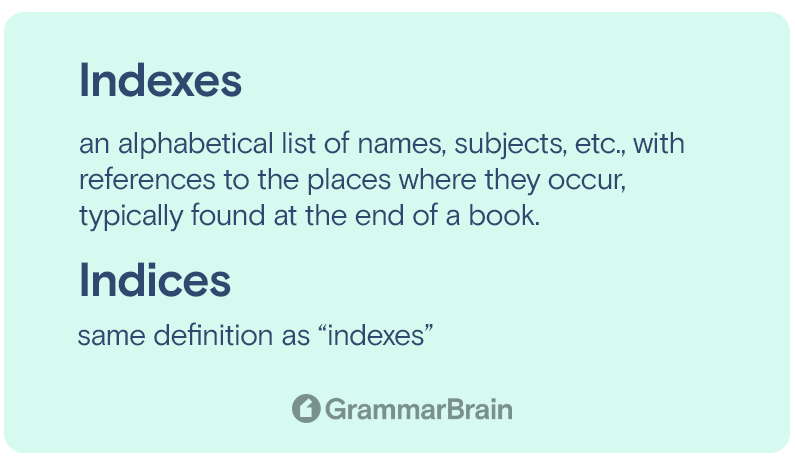What’s the difference between indexes and indices? The English language can sometimes make it challenging for writers to choose the right set of words. Even more so when a single word has two different plural forms.
Indexes or Indices?
Historically, “indices” was preferred over “indexes.” With time, the use of the American plural form of “indexes” increased with time. Today, both plural forms are widely used, although according to Google Data provided by Google’s Ngram Viewer, “indices” has a much higher use around the world than “indexes”.
| Word | Definition |
| Indexes | an alphabetical list of names, subjects, etc., with references to the places where they occur, typically found at the end of a book. |
| Indices | an alphabetical list of names, subjects, etc., with references to the places where they occur, typically found at the end of a book. |
What is the Plural of “Index”?
The noun index means “a list of some specified datum” or “a number used as an indicator or measure”. Indexes and Indices are two different plural forms of the same word – index. This is a rare occurrence.

When to use “Indexes”?
“Indexes” is known as the non-technical plural form of “index”. As such, it is mostly used informally and in many books. Experts also suggest the use of “indexes” for citation listings, bibliographies, and other lists mentioned in the last few pages of books and other documents.
Meaning:
As a verb, “indexes” means “to serve as an indicator”. There are multiple ways to conjugate this verb in other forms such as index, indexing, and indexed.
Indexes – Sentence Examples
Example 1: The mentioned link takes you to a page containing the indexes bifurcated by month.
Example 2: Applying sunscreen with SPF 15 or higher is recommended for protection against high UV indexes.
Example 3: Citation indexes are a list of all the citations mentioned in a series of documents.
Example 4: Mastering several indexes and schemas helps enable rapid recall or retrieval of previously learned material.
Example 5: Indexes contain details and statistics on all the websites that Google or any other search engine is able to find. This helps users quickly find information on a website and receive super-fast responses to their queries.
When to use “Indices”?
A more technical plural form of the same noun is “indices”. The use of this term is preferred over “indexes” in financial sectors while comparing statistics, and information referring to the stock index.
Meaning:
One of the meanings of the noun “indices” is – “an expression indicating a mathematical operation be performed”.
Using “indices” as a noun and “indexes” as a verb puts an end to any confusion that the use of “indexes” brings forth.
Indices – Sentence Examples
Example 1: The refractive indices of each glass should be checked and the best match chosen for your next pair of eyeglasses.
Example 2: For the diagnosis and classification of anemia, RBC indices are used which are calculations derived from the complete blood count of an individual.
Example 3: The existing indices for the performance study case have proved to be insignificant and can’t apply for further research.
Example 4: Quantitative indices are found to be attractive for organizations as they provide clear data and information that are reliable.
Example 5: Consumer price indices aid in understanding the compounded effects of inflation on poverty in a particular region.
‘’Index” is but only one such rare word where the plural rules of ‘-s’ and ‘-es’ both apply. There are other words where both the plural forms are acceptable. Merriam-Webster dictionary helps explain further – how to write plural nouns of different words and some exceptions to the above rules for plurals.
Inside this article
Fact checked:
Content is rigorously reviewed by a team of qualified and experienced fact checkers. Fact checkers review articles for factual accuracy, relevance, and timeliness. Learn more.
Core lessons
Glossary
- Abstract Noun
- Accusative Case
- Anecdote
- Antonym
- Active Sentence
- Adverb
- Adjective
- Allegory
- Alliteration
- Adjective Clause
- Adjective Phrase
- Ampersand
- Anastrophe
- Adverbial Clause
- Appositive Phrase
- Clause
- Compound Adjective
- Complex Sentence
- Compound Words
- Compound Predicate
- Common Noun
- Comparative Adjective
- Comparative and Superlative
- Compound Noun
- Compound Subject
- Compound Sentence
- Copular Verb
- Collective Noun
- Colloquialism
- Conciseness
- Consonance
- Conditional
- Concrete Noun
- Conjunction
- Conjugation
- Conditional Sentence
- Comma Splice
- Correlative Conjunction
- Coordinating Conjunction
- Coordinate Adjective
- Cumulative Adjective
- Dative Case
- Determiner
- Declarative Sentence
- Declarative Statement
- Direct Object Pronoun
- Direct Object
- Diction
- Diphthong
- Dangling Modifier
- Demonstrative Pronoun
- Demonstrative Adjective
- Direct Characterization
- Definite Article
- Doublespeak
- False Dilemma Fallacy
- Future Perfect Progressive
- Future Simple
- Future Perfect Continuous
- Future Perfect
- First Conditional
- Irregular Adjective
- Irregular Verb
- Imperative Sentence
- Indefinite Article
- Intransitive Verb
- Introductory Phrase
- Indefinite Pronoun
- Indirect Characterization
- Interrogative Sentence
- Intensive Pronoun
- Inanimate Object
- Indefinite Tense
- Infinitive Phrase
- Interjection
- Intensifier
- Infinitive
- Indicative Mood
- Participle
- Parallelism
- Prepositional Phrase
- Past Simple Tense
- Past Continuous Tense
- Past Perfect Tense
- Past Progressive Tense
- Present Simple Tense
- Present Perfect Tense
- Personal Pronoun
- Personification
- Persuasive Writing
- Parallel Structure
- Phrasal Verb
- Predicate Adjective
- Predicate Nominative
- Phonetic Language
- Plural Noun
- Punctuation
- Punctuation Marks
- Preposition
- Preposition of Place
- Parts of Speech
- Possessive Adjective
- Possessive Determiner
- Possessive Case
- Possessive Noun
- Proper Adjective
- Proper Noun
- Present Participle
- Prefix
- Predicate



